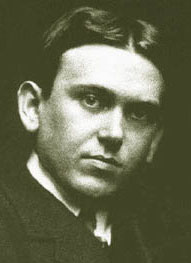A lot of twentieth-century America was written into the life of Aimee Semple McPherson, the evangelist who went from backwater tent revivals to Los Angeles megachurch media maven in short shrift. She was a feminine icon, progressive on matters of race before her country was, deeply charitable and in possession of a genius for broadcasting. She also had the type of sizable public missteps you would expect from a larger-than-life figure.
In the above classic photograph from the Los Angeles Daily News, the evangelist, left, prepares holiday baskets in a pantry. From H.L. Mencken’s 1930 writing about her in the American Mercury:
“For years she toured the Bible Belt in a Ford, haranguing the morons nightly, under canvas. It was a depressing life, and its usufructs were scarcely more than three meals a day. Often, indeed, there was too little money to buy them, and she had to depend upon the charity of the pious. She was attracted to Los Angeles, it appears, by the climate. The Bible Belt was sending a steady stream of its rheumatic mortgage sharks in that direction, and she simply followed. The result, as everyone knows, was a swift and roaring success. The town has more morons in it than the whole State of Mississippi, and thousands of them had nothing to do save gape at the movie dignitaries and go to revivals.
Aimée piped a tune that struck their fancy and in a short while she was as massive a local figure as Sid Grauman or the Rev. Bob Shuler. In five years she had a plant almost as big as that of Henry Ford, with an auditorium seating 5300 customers, a huge Bible School, a radio broadcasting station, a flourishing publishing house, three brass bands, three choirs, two orchestras and six quartettes. She is today the most prosperous ecclesiastic in America and her annual net takings exceed those of Bishop Manning.
But, as I have said, I doubt that she is happy in the homely secular sense, though the grace of God is undoubtedly in her. I detect a far-away look in her eye, an I detect a heavy heart in her book, despite its smooth, glad air of a Y. M. C. A. secretary. Certainly the attempt to jail her on perjury, a year ago, left some scars on her.
Connoisseurs will recall the outlines of the case: she alleged that she had been kidnapped, and the Los Angeles police alleged that she had been on a protracted week-end party with one of her male employees. She won in the end, but only after a long and nerve-wracking trial, in the course of which she had plenty of chance to observe that Moronia could punish as well as applaud. The trial, indeed, was an orgy typical of the half-fabulous California courts. The very officers of justice denounced her riotously in the Hearst papers while it was in progress, and she says herself that she was almost asphyxiated by the smoke of photographers’ flash-lights in the courtroom.”


